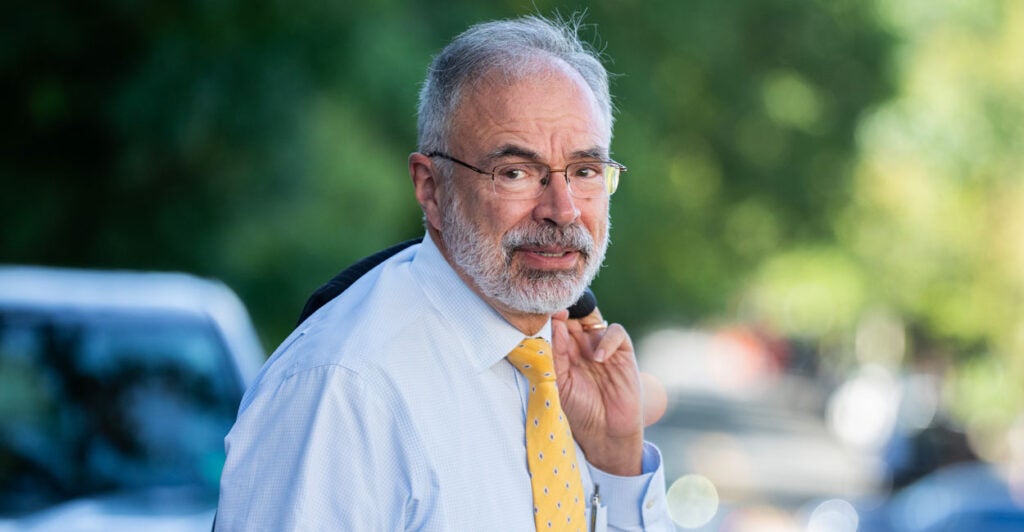ARTICLE AD BOX
Almost three weeks into the federal government shutdown, serious policy debates over annual spending and the future of health care remain on the back burner and are likely to simmer through the coming months even if Democrats acquiesce and agree to reopen the government.
The government funding extension, which Senate Democrats have continued to reject, was originally intended to provide seven weeks for passing appropriations bills, a timeline that has now shrunk to four weeks.
The Daily Signal asked Speaker of the House Mike Johnson, R-La., whether the time is fast approaching when the continuing resolution will no longer buy enough time for appropriations.
Running Out of Runway?
Johnson acknowledged the concern, saying the shutdown had halted genuinely productive work of appropriators in both parties and both chambers.
“Here’s the thing, the appropriators have been doing great work. They’re continuing to work even during the shutdown. They’re working individually and on their subcommittees and among themselves and even across the aisle to get the next batch of appropriation bills ready for passage,” he told The Daily Signal.
However, Johnson recognized the risks of a prolonged shutdown putting off important legislative work.
“Is the time eroding quickly? Yes. Is it dangerous for them to shut the government down right now? Yes, because we have very pressing matters that we need to handle, but we can’t do it when the Senate is stalling all of that,” Johnson told The Daily Signal.
“We passed 12 separate appropriations bills through the House committee. They’ve done their work—three of them off the House floor, three bills off the Senate floor,” Johnson continued. “They don’t match up exactly, so we’re going to conference committee on that. We have to finish that process. We have to rebuild the muscle memory for regular order, because that is how we serve as good stewards of the American taxpayers. We’re anxious to do that. We hope the Democrats will see the light.”
Johnson was joined at the Monday press conference by House Freedom Caucus Chairman Rep. Andy Harris, R-Md., who not only leads the House’s most fiscally conservative faction, but is also the chairman of an appropriations subcommittee dealing with agriculture, food, and drugs.
Despite the partisan gridlock, Harris expressed optimism that Congress can pass conservative funding bills to bend down the spending trajectory once the federal government is reopened.
“In the agriculture bill, for instance, we’ve agreed on level funding for it,” Harris told The Daily Signal after the press conference. Freedom Caucus members have advocated for, at a bare minimum, keeping spending flat in the appropriations process.
“I mean, that would be a major stumbling block. That’s sort of been agreed to,” Harris said.
“The question was asked about, ‘Are we running out of runway for November?’ No. I think we’re within days of actually coming to a final negotiated agreement on the first three bills,” he said, referring to military construction and veterans’ affairs, the legislative branch, and agriculture, adding: ”So, as soon as we come back in, I suspect within a week, that bill will be on the House floor.”
The Larger Health Care Debate
But despite Harris’ and Johnson’s optimism about prior funding negotiations, Democrats have made major policy demands, which they are unlikely to forget about in the near future. Among them is the extension of COVID-era boosts to Obamacare premium tax credits, which are set to expire at the end of the year.
Harris said he’s not interested in a simple, clean extension of this policy from President Joe Biden’s administration.
“We are not willing to talk about a clean extension, because that’s not a negotiation. That’s a demand,” the Maryland lawmaker told reporters. “If you talk about a negotiation where you are going to wind down these subsidies, eliminating some of the fraud and abuse potential, and you combine it with, for instance, eliminating upcoding on Medicare Advantage, which is worth about $130 billion [in savings] over 10 years, well, maybe there’s some package that you could think about, but it’s not going to come together in one week, and it’s certainly not going to be subject to extortion demand during a shutdown.”
 House Freedom Caucus Chairman Rep. Andy Harris, R-Md. (Tom Williams/CQ-Roll Call via Getty Images)
House Freedom Caucus Chairman Rep. Andy Harris, R-Md. (Tom Williams/CQ-Roll Call via Getty Images)Upcoding in the context of Medicare Advantage—the system of Medicare plans delivered by private providers—refers to providers inflating diagnoses and exaggerating patients’ health risks in order to extract more funding from the federal government.
Throughout the debates over the July budget reconciliation bill, Freedom Caucus members sought spending cuts to offset any potentially deficit-increasing provisions, and they appear to be advocating a similar approach in the current health care debate.
Harris regularly communicates with members of the Main Street Caucus, a group of House Republicans with many members from closely contested swing districts. Although the two caucuses’ members have different perspectives on the tax credits, there appears to be some overlap in their positions.
Main Street Caucus Chairman Rep. Mike Flood, R-Neb., recently told The Daily Signal that members of his caucus are seeking an extension of the Obamacare tax credits, but are also interested in eliminating fraud connected to the credits.
“We see value in extending the ACA [tax credits]. We understand there’s a lot of fraud there, and we want to root that out,” Flood said.
The post Shutdown Putting These Policy Debates on Back Burner appeared first on The Daily Signal.
.png)
 2 hours ago
2
2 hours ago
2








 English (US)
English (US)